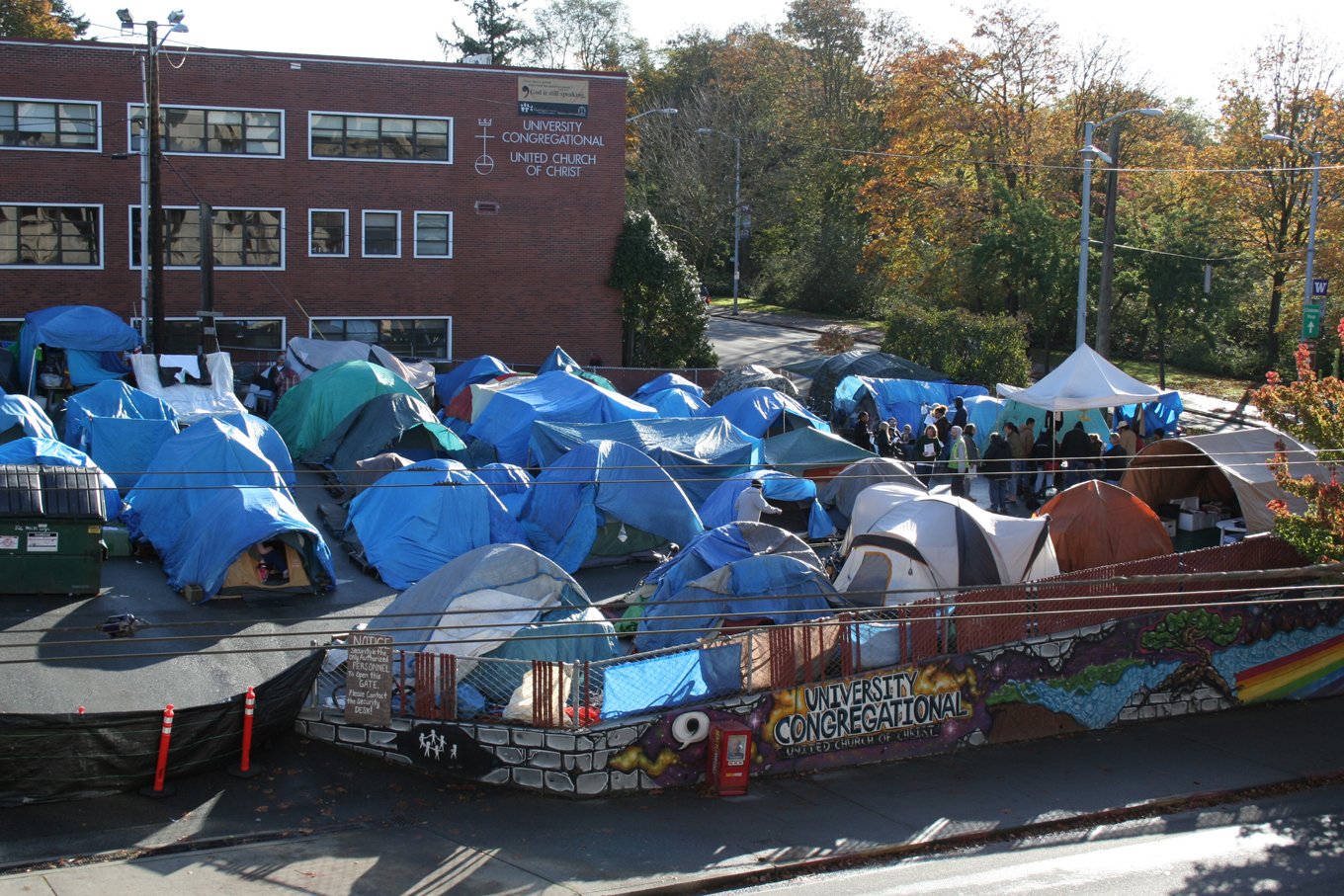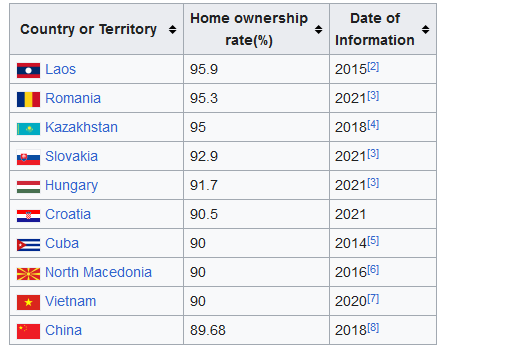cross-posted from: https://lemmy.crimedad.work/post/12162
Why? Because apparently they need some more incentive to keep units occupied. Also, even though a property might be vacant, there’s still imputed rental income there. Its owner is just receiving it in the form of enjoying the unit for himself instead of receiving an actual rent check from a tenant. That imputed rent ought to be taxed like any other income.
Landlords do have to pay an income tax on property regardless of whether it is occupied or not, it is just that when a property is not being rented, it generates 0 income and 30% of $0 is $0.
Do you mean some sort of land appreciation tax?
Don’t forget about real estate taxes in lieu of an income tax when empty. They are due whether a place is rented or not.
Income tax can only tax income.
As others have said - land value / property tax is supposed to take care of this. You could also add a specific vacancy tax.
In Switzerland real estate generates a virtual rent that you need to pay income taxes on.
E.g. even if you buy a house for yourself, the money that you save by not having to pay rent is calculated as extra income.
I disagree with a specific vacancy tax. If that’s truly an issue, we should increase the property tax. Property tax it already due regardless.
A property tax would just pushed onto renters like mortgages already do. A vacancy tax would not have a renter to push onto.
Landlords would still probably factor it in, so I think assuming a base vacancy rate of 1-2 months months per year would be wise. That way, there is time for normal maintenance between tenants, and if it adds up over a few years they’d have time for major repair after a long time tenant leaves, but it would still incentize not leaving the house vacant unless absolutely necessary.
Most vacancy taxes around the world only kick in after a period of vacancy, say 6 months.
Sure, but it pushes it onto wealthier people more, since generally cost of property scales with income. It would also discourage vacancy even more, which would put more properties on the market, and it would probably push property values down because the long-term cost of ownership is higher. Likewise, cities and states tend to get their income from property taxes, so they could reduce sales taxes to account for it, and sales tax is much more regressive on the poor.
So I think it would be a net benefit.
You do realize this discussion is about the housing crisis right? The one caused by the available units being below the demand for them, causing prices to rise?
Punishing landlords for vacancies won’t materially help things, the only real solution there is zoning changes to encourage more construction of higher density housing instead of lower density housing. We can only build so many housing units in a given year, so we should be focusing on higher density instead.
But we’re not talking about zoning in this thread, we’re talking about taxation.
Vacancy rates are really low for residential property pretty much across the board, at least relative to the last few decades. So there’s not a lot we can do just by changing the costs for vacancies. The reason I suggest increasing property taxes is for a few reasons:
- property taxes tend to hit wealthier people more than poorer people because wealthier people have more property
- higher property taxes make single family homes less attractive because the cost is higher per unit than multifamily homes
Since we have a limited capacity to build new housing, we should encourage building the types of housing that will resolve the crisis. Penalizing vacancies just encourages landlords to fill vacancies ASAP instead of renovating properties, whereas increasing property taxes should encourage more dense construction.
I’m sorry, I misread your post, and completely missed the last line (it was a long day). I thought you were arguing against this suggestion.
I agree, taxes aren’t a huge part of the solution, and incentivizing high-density housing (as well as making them more palatable)is a bigger part of it.
The housing crisis cannot be solved by taxes. They are irrelevant.
This is basic economics, supply and demand. Reducing demand will affect prices, and incentivizing not having vacant properties will increase supply.
This is not the complete solution, but it will have some effect. And thinking there is a single complete solution is as wrong as thinking that the suggestions in this article are that complete solution.
Changing taxes won’t do anything as they don’t affect the property market much. The only real solution is to build more. But to build more, construction should be deregulated. But that will make landlords in the government poorer so that will never happen.
Why stop at a vacancy tax?
We should go full georgism.
Losses during the vacancy period would just be accounted for by bumping up the rent on tenants a bit. If you expect an average vacancy to cost you $1200, you’ll just increase rent by $100 a month.
Sure, you could accept the loss, but if you’re okay with that lower profit margin, you’d have already decreased the rent by that same $100.
It assumes the owner is planning to fill up the house sooner rather than later. It would punish those who are just sitting on empty houses for an extended period of time because no renter would want to pay the extended vacancy for that extended period, and progressively gets worse with each added time period.
I’m not hugely against vacancy taxes really, but they need to be well-targeted to not affect the occasional bit of bad luck or renovation. Otherwise, the only way it actually helps the market is if it causes enough previously withheld supply to enter the market, and most expensive cities don’t actually have all that many vacancies. NYC is at something like 5%, which included units between tenants and those under renovation. Sure, there’s the occasional billionaire with an empty penthouse, but compared to the millions of renters looking for normal housing, there really aren’t that many rich oligarchs hoarding housing for fun and games.
Its why i think of they did, there should be a minimum amount of months, and then applies after the amount of time.
If the landlord can increase rent by $100 and the market will bear that, why is the lack of a vacancy tax stopping them? Landlords charge the maximum that the market can bear.
All landlords have occasional vacancies, so a vacancy tax would increase the costs that all landlords bear, at least slightly. Landlords will name the highest price that won’t cause renters to simply choose an alternative. If there is no cheaper alternative because the entire market is being affected, they simply have to find a way to deal with it.
Many vacancy taxes already exist all around the world. There is not a single one that taxes normal short vacancies. It is just false that this increases costs for all landlords. The vast VAST majority of landlords will never pay it.
On the other hand, the increase in supply due to the tax can be noticeable, which has a much bigger effect lowering prices.
Higher property taxes=higher rents to pay property tax
In a vacuum, sure, but it would also discourage vacancy, which increases supply and thus puts downward pressure on rent prices.
I’ve heard of landlords artificially decreasing supply as rents go up so they can maximize profit per unit, or at least maximize expected rents to allow for better terms on loans (see NYC’s insane real estate market). This would penalize that.
Also, property tax is often a progressive tax since it’s based on value, not consumption. Many states get most of their revenue from sales taxes, so a state level property tax could replace a sales tax, which is notably regressive on the poor.
It would discourage home ownership and probably encourage more dense housing (reduces taxes per housing area), which is a lifestyle change but probably better for urban planning.
Income tax on no income sounds fucking stupid. Just up property tax on the 3th or 4th house or apartment by a fuckton, watch everyone panic sell their shit crashing the housing market into oblivion and call it a day. Ez affordable housing.
Denmark applies a property tax to foreign properties at ones disposal. If it’s rented, it’s waived and tax is levied on the rental income. If it’s unoccupied, it’s considered a luxury available for your use and thus is taxable property, even though it’s in a foreign jurisdiction.
But then the almighty homeowners home value might collapse too!
But for real landlords wohld start destroying their own housing stock to take some tax write off or insurance fraud.
Most landlords are like massive corporations, if all the property your corporation owned suddenly exploded it may rise a few eyebrows. Someone’s rich aunt renting their second summer home isn’t having that much of a detrimental effect on the housing market as corpos buying up all available housing.
My point is they would find some way to legally dispose of their stock to artificially decrease supply and raise prices again. Its particularly the big corporations who would do this.
Maybe but then like stop whatever loophole they are using. Doing nothing is quite a lot worse.
Thankfully the housing market is still fine in my country so I don’t have a dog in the race but people in the US should take some pointers from the French and fucking riot at this point. All of yall have like 5 guns per person yet you are like the most demure country when it comes to politicians and corpos just exploiting the fuck out of you.
people in the US should take some pointers from the French and fucking riot at this point. All of yall have like 5 guns per person yet you are like the most demure country when it comes to politicians and corpos just exploiting the fuck out of you.
Careful, that kind of talk gets you labeled a tankie
Really shows the propaganda power.
deleted by creator
Multiple holder companies incoming. Now that will need to be plugged up.
Not saying this is a bad idea. But they will find loopholes.
Don’t allow companies to own homes. Homes should not be investments.
Then renters will be homeless.
- Require rental properties to be registered and report when vacant.
- Block any new single dwelling rental property purchases.
- Only allow more rental property purchases when vacancy rate is below a certain threshold in a metropolitan area.
Yeah, there was just recently a big scandal in my city where one guy bought 20 houses with 9 shell companies. Attempted to do shitty flipping jobs. Selling the houses from one company to the next so they didn’t immediately jump up in price in the real estate history.
The sad part is: if he hadn’t overpriced the market and sold more of them he would’ve gotten away with it, but he waited too long and got stuck. But until that point nobody knew one guy had 20 houses, it was 2 per company on paper.
Every single one of all the government measures I’ve seen to “help people” in the current “tight housing market” is designed to prop-up housing prices and rents, never ever anything which would lower rents or house prices.
In my country they even given money to renters rather than, say, impose rent controls or start large projects building public housing and do this all the while claiming there’s not enough money for things like Education.
From my own experience working in Finance every single government measure I’ve seen on this since a decade ago sure looks a lot like using the power of the State for manipulating the housing market to push prices up.
deleted by creator
Landlords should not exist in the first place. When fantasizing, why aim for mediocrity?
When fantasizing, why aim for mediocrity?
Mediocrity is as ambitious as liberals can be
deleted by creator
I’m Mike Ehrmantraut and I approve this message.
deleted by creator
landlords don’t build housing
deleted by creator
deleted by creator
deleted by creator
Because you don’t seem to be connecting the points together. Lead a horse to water but can’t force it to drink kinda situation.
Landlords didn’t do anything but have capital. Workers built the damn thing.
That’s the water I was talking about.
deleted by creator
They pay for it to be built. Unless you think the workers should work for free and not receive any benefit from their labor. Does hexbear know you feel this way? 🤣
Landlords don’t pay for buildings to get built, the renters ultimately do. Landlords are just middlemen.
Landlords pay up front (directly or via a loan, which the renters presumably cannot get) and assume the risk of vacancies and repairs. If landlords ceased to exist, how do you propose new housing stock be created? Should the government be your landlord?
Landlords pay up front (directly or via a loan, which the renters presumably cannot get) and assume the risk of vacancies and repairs.
And then they get bailed out by the government when their risk blows up.
And they have little to no risk in the first place because the market has such high demand that they can pretty much instantly fill vacancies, and they barely do repairs if at all. And at least where I live, renters are required to have/pay for renters insurance which further drives down the landlord’s risk. And on top of all that, they have security deposits to lower their risk even further. They don’t take on any meaningful risk.
If landlords ceased to exist, how do you propose new housing stock be created? Should the government be your landlord?
Government investment into housing development (which then turn into market rate housing/co-ops), zoning fixes, and a LVT is the solution. The builders get paid, home ownership becomes affordable, the risks are dealt with, and renters aren’t being priced gouged. It would also do wonders to help fix the homelessness crisis.
And none of it needs the government to own your home.
Investment into housing development, zoning fixes, market rate housing, co-ops, and a LVT is the solution.
You can’t be serious? Let’s review.
Investment into housing development
By who…? Come on, be honest, who do you think is going to do this 🤣
zoning fixes
That allow who to build more housing?
market rate housing
Is literally what the West has right now.
Co-Ops
We have these now.
and a LVT
This is a fine step. Most states have property taxes now that include the land that a rental sits on.
If you can’t pay for your own housing, your choices are either for the government to pay for it, or for the private sector to pay for it. In either event the entity that owns your house, that isn’t you, is your landlord. If you can’t pay for your own housing, and you don’t want the private sector or the government to provide it for you, then you’re homeless.
Landlords pay up front (directly or via a loan
You’re describing a developer. Most landlords aren’t developers.
And yes, the government should take on the role of developing residential properties and ensuring everyone has access to them. Housing is not a commodity, it’s a basic human need.
not to mention, many big developers aren’t paying cash to construct housing. they get a loan or establish a line of credit with or brokered via investors/banks/funds. the first rule of doing anything under capitalism is to use somebody else’s money to do it, and all those loans drawing on lines of credit ultimately leads back to the central bank anyway.
it’s a massive shell game to obscure the fact that workers do all the work to create the products and services and then have to pay their shitty wages right back to access the very things they create, just so maybe 2-3 million megarich assholes can roll around in piles of money and make an income for doing literally nothing.
landlords are among the most nakedly parasitic sectors of society, and even then we still get bootlicking bozos pretending they “provide” housing or are somehow responsible for the community infrastructure that makes living in the place where the house exists desirable.
Food is also a basic human need, and markets seem to work well-enough for that. The core difference is that, while we have an extreme abundance of food to the point of waste, cities have been underbuilding housing for decades and there are far more people wanting to move to them than available housing units, so only the richest people get the housing. This puts a lot of positive pressure on housing prices
Oh the risk! Well sure that entitles them to take money from people who actually work. Go find a landlord and

of course they do. we actually understand that production doesn’t require middle men. we’re communists, fool.
wait till you understand what ‘tax’ is
Oh, so you just want the state to be your landlord? Enjoy your cinderblock gulag.
deleted by creator
deleted by creator
You can rent from someone else. That’s actually easier than moving cities, states, or countries.

hmmmm
hmmm

Western countries already provide resources for our less fortunate friends and neighbors. But we don’t use the police power of the state to force those resources on people that don’t want them. We also don’t round them up and force them to fight for our Moscovi overlords that are just a itsy-bitsy more equal than the rest of us. Hmmmm
deleted by creator
deleted by creator
As someone who has been homeless, I would MUCH rather live my entire life in a “cinderblock gulag” then spend even a second homeless. So, yes, if we ever were to get such buildings provided to us from the government, I would greatly enjoy them.
If you own property the state is already your landlord.
Well, then tell the government to come clean my gutter.
Oh, you want capitalist housing? Enjoy your tent getting destroyed by cops.
No they usually don’t pay for anything to be built. Even if they did, they just pay for it with other peoples labor (their renters)
Housing can get built without the professional middlemen involved, believe it or not.
Right? I think it’s weird. If nobody pays the house, they just don’t build more house, I guess.
deleted by creator
People, collectively.
Ideally all the shitheads obsessed with “owning” get removed from the equation
People, collectively.
But they’re free to do that right now and it doesn’t happen. Not on the scale we require. Asking people to donate their time to build houses just isn’t a scalable solution in modern society.
modern society.
You misspelled capitalist
This is a very sudden jump from “housing shouldn’t be so expensive”, which essentially everyone agrees with, to “we should abolish private property”, which you’ll find is a significantly less popular proposal.
deleted by creator
Communism brought Russia from a feudal industrial backwater to putting the first people in space in the span like 20-30 years, and they crushed the Nazi war machine in the process.
deleted by creator
Go and have a look at Russia to see how how this communist/socialist mindset worked out for them.
With an 89% home ownership rate? Yeah, damn, it would really suck for 9/10 people to live in a home that they own.
Almost all the top countries on that list are socialist or were socialist until the 90s. It’s almost as if socialism actually results in homes being treated as basic needs for people instead of commodities for landlords to make money off of.
NPC talk. Youre just spouting lines
I used to be a bourgeois land owner, but then I took an arrow to the knee.
Did you see that poor person? Filthy creatures.
Let me guess, it was also Venezuela’s fault too?
People like you are all NPCs.
Removed by mod
got something wrong with pronouns?
Removed by mod
what’s wrong with you
deleted by creator
Heres one of the largest housing developments in new york: https://en.m.wikipedia.org/wiki/Co-op_City,_Bronx
Not landlords, because we’re imagining a different society than the single model in your aphantasia afflicted head, believe it or not
Let’s start with pretty much the entirety of millenials and gen z that would love to own a home.
I mean, then there’s the homeless.
The people living in them usually.
Landlords do not build houses, they just rent them out. Housing, shelter call it whatever you like is human right and essential need, so it should not be a part of speculations for profits. Now you can see overpriced real estate because of investors who buy it and never live there. All this “helpers” who rent out their apartments bring more harm than benefit for society (they at least contribute to a price growth in real estate). Buildings could be constructed by government owned organizations in order to provide society with housing, no need in speculators to solve problems.
deleted by creator
Ok, so you want the government to be the landlord as you have more trust in a government monopoly than in a market.
Yup. Basically. Although it is worth noting that the type of government we currently have, beholden to capital, is not trustworthy. Their priorities first and foremost are to serving corporate interests, which is probably why you trust them so little. Any power or public capital they are entrusted with gets pumped into private companies whose sole purpose is to make as much profit as possible for as little expenditure.
Any government brave enough to outlaw private landlords is going to have much more socially oriented priorities and will be much more inclined to serve the public good rather than the almighty market.
deleted by creator
depends on problem you are going to solve, if you want to provide people with affordable housing, then challenge your beliefs in almighty market.
While he’s doing that, perhaps you could challenge your belief in the efficacy of big government. Countries which prevent markets from operating efficiently tend to do really poorly over time. The more authoritarian, the worse they perform.
I think the solution lies somewhere between government and markets.
hehe considering market propaganda in education, on every media it is hard for me to not challenge my “belief” on a daily basis.
unfortunately in your comment you repeating neoliberal propaganda, please check guardian article on “free market zone libertarian experiment” tldr it led to low wage sweatshops and workers repression (and spoiler even this libertarian experiment relied on governmental support)
I argued that the solution is both, not one or the other. You provided me an example of an extreme in the other direction. I also think libertarianism and anarchy does not work. Please re-read my comment.
I think the solution lies somewhere between government and markets.
Fair.
If we, the workers, are the ones running that government monopoly and not an oligopoly of landlords and other speculators then yes, that would be more fair. It’s also a vastly more efficient way to guarantee that everyone is housed, as history shows
Ok, so you want the government to be the landlord as you have more trust in a government monopoly than in a market. Fair. Just not something I agree with.
ok, so you want a society where people, yourself included (though I have a feeling you like to pretend otherwise), can end up homeless and destitute because… They don’t have enough of this imaginary thing some people made up so they could centralise their power and commodify the existence of the rest of us for profit, so they deserve to be left for dead, and that is something you agree with…
In other words - you’re oblivious scum
deleted by creator
Food is also an essential need, but it absolutely has a massive profit-driven market around it that generally works. I’d argue that there are specific flaws in the housing market that can and should be addressed, not that the very concept of having a housing market is inherently flawed.
Food also enjoys massive amounts of competition amongst what type of food to eat. Housing doesn’t.
At least here in the states unprepared food isn’t taxed either.
Should more be done to get food to the needy? Absolutely. Should we allow unfettered accumulation of private property (every domicile beyond your residence) at the behest of personal property (your residence)? I don’t think so.
Let people own more than one home; after everyone has one.
Otherwise it’s just cruelty as a feature of society, not a flaw. And I in good conscience can’t get behind that
Food also enjoys massive amounts of competition amongst what type of food to eat. Housing doesn’t.
You’re actually on to something here. There is far far far more food produced than we could ever consume; so much that a massive amount is literally thrown away. Whereas with housing, we’ve been grossly underbuilding for decades now. If, in a year, you have 25,000 people who want to move to your city, but you’ve only added 2000 units of housing, then the inevitable result is that the richest 2000 people get the housing, and the owners of that housing can charge extremely high prices. Given this, why the hell is it literally illegal in most of the land in our cities to build anything other than a detached single family home that might house four or five people, as opposed to a duplex or small apartment building that could house two or three times as many?
I’m not saying that we shouldn’t tweak around with the allocation incentives, but there’s simply no where to policy your way around the fact that our urban areas have far too little housing for the amount of people who want to live there.
for sure, there are many essential needs beyond housing and food. I cannot agree that it works well with food either, starving still exist even in “developed” countries. It looks you are trying to a patch something that really flawed. Unfortunately it is not a way. We should move away from profit oriented society and away from human exploitation.
You’d just swap profit for influence instead. Look at the USSR, they had issues feeding their population, yet the people in power largely got whatever they wanted.
See the famous trip Boris Yeltsin took to a Texas grocery store. At least in those days, capitalism handily beat communism in providing a variety of foods to the average person.
So the profit motive certainly has some benefits. It also has downsides, such as unequal Income distribution. But then, existing examples of communism/socialism also have similar problems.
So I think the discussion about economic system misses the mark. We can regulate capitalism to provide many of the benefits we want, so the discussion should be on what we actually want and what changes we need to make to get there. For housing, we could solve the problems we see in a number of ways, each with downsides, such as:
- subsidize renting
- increase property taxes to reduce vacancy
- add a vacancy tax - probably harder to enforce
- build more public housing - I haven’t been impressed with section 8 housing, so I’m not bullish on this one
- rent controls - seems to backfire more than help because it removes the profit motive to improve rentals
And so on. Switching the economic model comes with huge costs and I’m not convinced it’s actually better than fixing what we have.
You’d just swap profit for influence instead. Look at the USSR, they had issues feeding their population, yet the people in power largely got whatever they wanted. See the famous trip Boris Yeltsin took to a Texas grocery store. At least in those days, capitalism handily beat communism in providing a variety of foods to the average person.
I cannot accept your argument since variety of brands for similar product in the store doesn’t mean society can feed itself. It is wrong angle to see on the object. Since there is various of factors which could easily destroy such logic from quality of food to affordability (simple a lot of product in store, but people cannot buy it). Much better metric is satisfying the need, in our case in food. So in our case we should look at calories consumption and nutritional value. Look at cia document where conclusion is “American and Soviet citizens eat about the same amount of food each day but the Soviet diet may be more nutritious”.
The conclusion is that Americans ate too much, meaning there’s more food available than necessary, whereas Soviet citizens ate a better amount, but it consisted largely of less expensive foods like potatoes. Americans ate a lot more fish and meat (21% vs 8%), which is likely a marker for prosperity differences between average citizens. The difference was pretty small (~250 calories according to that document), so I’m not exactly sure what your point is.
In the USSR, we have a few examples of famine, such as Holodomor, and the US stepped in during the famines in the 1920s. Between those two periods, we see millions of deaths, somewhere between 5-10 million.
On the flipside, during the Great Depression in the US, few people starved and life expectancy likely rose. During this period, the US went through the Dust Bowl crisis, which doesn’t seem to have resulted in starvation (though it did result in displacement).
So from what I can tell, the US had much more consistent food availability throughout even the worst of crises, whereas the Soviet system seemed to struggle. Granted, starvation wasn’t really a thing after 1947, so the USSR seems to have at least met minimum expectations for food production. This is a decent Reddit thread on it, and the result is essentially that farmers don’t like collectivization much at all, and sometimes that resulted in huge problems like food shortages, and the USSR often resorted to imports when production wasn’t enough:
A system of state and collective farms, known as sovkhozes and kolkhozes, respectively, placed the rural population in a system intended to be unprecedentedly productive and fair but which turned out to be chronically inefficient and lacking in fairness… However, Marxist–Leninist ideology did not allow for any substantial amount of market mechanism to coexist alongside central planning, so the private plot fraction of Soviet agriculture, which was its most productive, remained confined to a limited role. Throughout its later decades the Soviet Union never stopped using substantial portions of the precious metals mined each year in Siberia to pay for grain imports, which has been taken by various authors as an economic indicator showing that the country’s agriculture was never as successful as it ought to have been.
So basically, the USSR was dependent on food production in the west because its own production was often lacking. So not only did the US have more than enough food production for its own population, but it also had enough to help out the USSR (e.g. this massive grain deal).
so the discussion should be on what we actually want and what changes we need to make to get there
Come now, that’s far less entertaining than tribalistic shitfling on the Internet, and isn’t that the real objective here?
Joking aside, a big solution that should absolutely be on that list is abolition of single-family zoning and a general reduction in the amount of red tape involved in building more housing. There are, and I am not kidding, multiple examples of middle-density housing being blocked because some local NIMBYs tried to have a laundromat protected as a historical landmark. In California, endless demands for environmental reviews can be weaponized such that the legal fees and wasted time make the financials for new housing fall through. And that’s even assuming you can find land that isn’t exclusively zoned for single-family homes. San Francisco has one of the worst housing markets in the country, and despite that, on 38% of its land, it is illegal to build housing that isn’t single family homes. At the end of the day, if you have a million people looking for housing and only a third as many units available, you can either build more, or you can accept that only the richest third of them will get housing. One of those options is much more enticing if you’re claiming to care about the poor.
abolition of single-family zoning
I disagree, we should just make it less attractive. This can happen in a few ways:
- improve mass transit, and encourage higher density along transit arteries
- make vehicular traffic less convenient by routing it around city centers instead of through - i.e. encourages mass transit use
- increase property tax and reduce sales tax - basically encourage using less space and using more services (i.e. rely on the local shop, not your own food storage room)
And so on. The benefits here are varied, such as:
- less traffic in city centers
- more green space, since the space isn’t occupied by as many SFH
- less road maintenance because you need fewer roads
- healthier people since using a bicycle or walking would be more convenient than driving
But as you noted, the above gets blocked by NIMBYs. But it is possible, as we can see in the Netherlands, which has largely reduced its vehicular traffic and improved the residential density. It wasn’t always that way, but they made a big push for it and people now don’t want to go back.
Hmm yes, when I want a house built I call up a landlord, this is very logical behavior
70% of housing stock in the UK was built by the government in the 1970s
The same crews who do now 🤨
I never saw a landlord or developer do any work to prepare an area or build anything on any of the jobsites I was on.
And who paid those crews?
The renters, ultimately. Landlords are just middle men who need to be cut out of the equation through a land tax system and massive investments in housing development, zoning fixes, and market rate housing/co-ops.
The only “job” landlords have is owning, which isn’t a job and adds nothing. They are a burden and inefficiency of the economy, and a burden on people.
I actually agree with a lot of those proposals, but property ownership still comes with a level of long-term required investment that many people simply do not want and cannot afford. You could vaporize every landlord in New York City today, and the housing would still be incredibly valuable and far more expensive than most people could afford. I live here myself, and while I do hope to own some day, that’s simply not financially feasible for me right now. People like me need to rent, and thus we need to rent from somebody. I only moved here a year ago, and I’m quite happy to have not had to combine all the hassle of moving with the added pressure of purchasing an asset that will tie up my net worth for a good few decades.
I can see some merit to systems like China or Singapore where land is leased directly from the government rather than private landlords (and arguably, given the existence of land and property taxes, it’s a nominal distinction really), but still, you’ve got the existence of an intermediate owner that performs maintenance and searches for tenants, with the bonus and curse that that intermediate has no profit motive to actually perform that work.
but property ownership still comes with a level of long-term required investment that many people simply do not want and cannot afford.
That’s largely due to the lack of supply of housing. And that’s why I think the government should be absolutely spamming housing units. Even if we kept landlords, they’d have no leverage to keep rents sky high.
People like me need to rent, and thus we need to rent from somebody.
And I think that your choice for that somebody should be better than some rich fuck who owns half the city’s housing (mildly exaggerating).
you’ve got the existence of an intermediate owner that performs maintenance and searches for tenants, with the bonus and curse that that intermediate has no profit motive to actually perform that work.
The person who does that work doesn’t need to be the owner though.
You know, so long as we can agree that lack of supply is the core issue, the rest of all that is really just details haha. I’m not hugely confident of public housing’s track record in the US (though there’s obviously a lot that went into that), but whether it’s new public housing or just loosening zoning and allowing the market to actually meet demand, I don’t really care so long as there are units.
There is value in someone figuring out all the finance mess so that when someone wants a place to live it exists. I.know how to build a house (I was in construction in my younger days). I don’t want to spent 200 days of my life building a house, I just want a place to live.
There is value in someone figuring out all the finance mess so that when someone wants a place to live it exists.
That’s the job of a manager, which isn’t what a landlord generally does. And even on the rare times when a landlord actually does do some financial management, it takes up a minority of the time.
I don’t want to spent 200 days of my life building a house, I just want a place to live.
I would like to do so at some point, and I don’t blame you for not wanting to do so. But housing needs to be affordable and it isn’t.
deleted by creator
Generally speaking, construction workers were found to be better at building houses than landlords.
And do the construction workers build housing for free? Or do they deserve to be paid?
Who even said they don’t deserve to be paid? Also, construction workers are typically paid by the construction company or contractor.
Landlords should not exist
I’m not even sure why I’d respond to someone as intellectually dishonest as you. But if you want to live in a shelter, your shelter has to be paid for. If you can’t pay for the full construction costs yourself then you have to get a loan and the bank gets paid. If you can’t get a loan, then you have to pay someone that can get a loan and that person gets paid. This isn’t a hard concept.
If you’d like to argue that the state should provide a minimum shelter for every individual, then that’s a interesting conversation that we can have. But a simple “landlords shouldn’t exist” is an unbelievably ignorant position held only by children and morons. Because even if a “the state provides shelter” scenario it’s the state that is your landlord.
But if you want to live in a shelter, your shelter has to be paid for.
no, because housing is a human right, and the fact that you want to live in a society where someone has commodified your right to survive to this degree, is as pathetic as it is terrifying.
If you don’t think that housing has to be paid for, via any number of reasonable means, then you’re explicitly arguing that you deserve the labor of others. That’s called stealing. And slavery.
If you want to have a reasonable conversation, tell us how you think the workers that produce the materials and build the housing should be paid. The only pathetic thing is when people refuse to answer this question.
And who’s paying the construction company or contractor?
Like, if you want to advocate for the abolition of private property ownership, that’s fine, and it’s a model that has actually worked halfway decently in some countries (though the lifetime leases aren’t necessarily that functionally different than ownership). But just own up to what you’re actually proposing and state that you think the government should own all property.
state that you think the government should own all property.
and who do you think composes the government?
elected represenatives.
The vast majority of the US’s housing stock has been paid off. Every time a residential property changes hands, the bank gets to re-collect all of their fees for…what, exactly? Making money available? They only do that because they’re underwritten by the federal government, subsidized by taxes.
So why don’t we just give direct loans to people, and subsidize those who need it directly instead of funneling the money through dozens of greedy hands taking percentages off the top?
Or in other words, the government becomes the landlord. If you’re not allowed to transfer ownership to someone else, you don’t own it.
The construction workers got paid within a short time of the house being built. The developer got most of the money, and the bank continues to collect on the property for decades. The value of most of the US’s housing stock was paid for years ago, and now we are all just paying for financial shell games to enrich the already rich.
Never mind how ridiculous your question is to begin with (what do landlords, the useless money syphoning middlepeople, have to do with building???), but the reality is that there are already enough empty properties to house all of the homeless people in most countries you check (US, UK, Canada for starters), not only once, but several times over.
It isn’t lack of housing that causes homelessness, it’s capitalism and the selfish greed it encourages.
That statistic regarding available housing ignores a lot of things. Where do the resources come from to keep this available housing in livable conditions? What is considered the minimum livable condition for these spaces? Who is responsible for keeping these spaces livable? What guarantee is there that any of this available housing is within reasonable travel distance of other necessities (not even speaking of employment, there’s urban food deserts to consider)?
At some point there is a required expenditure of resources, even if enough physical homes exist.
Landlords should pay 100% tax on their empty rentals.
You’ll see how fast they will accept any and all new tenants, at a much lower price.
Which would also flood the market with housing, lowering the prices even more until renting becomes an actual beneficial option compared to buying and paying off a loan.
Real estate would also not be seen as an investment anymore.
They should pay 100% tax on all rentals.
In this case landlords could just pay some money to fake tenants to make their rentals appear occupied (at a ridiculously low price). Rental prices could even rise because of free rentals number reduction and necessity to cover additional expenses.
Real estate should be considered an investment. It’s one of the few things people invest in that is actually valuable. It’s the speculative and labrynthine financial markets that are the problem in that regard.
The only reason mega-renters like Blackrock and Vanguard are able to monolithically buy property in the first place is because of dubious speculative earnings and government bailouts.
It’s not surprising that home ownership was actually a lot higher 60 years ago.
People require to land to live on, it is a basic necessity, and basic necessities absolutely should not be considered an investment.
What should people invest in then? How is land ownership handled? Etc etc etc
But why should it be anything but a personal investment? I’m not seeing your point there. Isn’t it better for everyone to decommodify housing?
Why should it be anything but a personal investment?
What do mean? I don’t see how what I said negates that.
Isn’t it better for everyone to decommodify housing?
Not really no. Commodfication is why things used to be cheap. High [insert item here] prices are directly related to money printing, corporate welfare and regulations that are designed to raise the barrier of entry for normal people.
Commodifying things makes them cheap? As opposed to decommodifying? That makes no sense
What is an example of decommodifying?
Nationalized healthcare
Making something unsuitable for investment so we preserve its primary function (houses being a home to a family and not an airbnb or an empty rental).
Why should it be an investment at all?
Real estate should be considered an investment.
Housing can be affordable, or it can be an investment. Not both.
It didn’t work this way in the real world.
I’d be so angry if I found out a nusince neighbor was paying less rent than I was.
100% on $0
Genius
Not to be a downer, but how does this fit into personalfinance? Like at all?.. I mean, I agree with the point but this belongs in politics or something.
Yeah, this post should be removed.
I’m glad to find this comment here. I was about to unsubscribe because I’m here for personal finance; not tax policy debate or politics.
Now if a policy like that did come out and the article helped to navigate or take advantage of it as an individual, then I would be interested.
deleted by creator
Isn’t real estate affordability an important part of personal finances?
This is an opinion piece on something that might slightly effect rent. If this is personal finance related than so is literally every economic or business article ever written. Because everything can maybe effect someone’s rent or other expenses.
I’m going to be honest, I see where you come from, and how this is not textbook personal finance.
However, Lemmy is still in its very infancy, and I try to keep this community active. It’s not always easy to find content to post (most of the PF subreddit is usually questions from users), so here it is.
By the way, if you have any interesting content or question, feel free to post as well!
Literally no one can afford houses these days. This only affects rich and privileged people.
There are plenty of houses for sale in the 50-70k range in smaller towns that orbit large cities but sure, “literally no one”
One of the worst parts about house searching is when you look up how much you can get for relatively little if you’re willing to live in impovershed areas in the middle of nowhere. The kind of places defined by the main industry that left the area at least a decade ago.
Then compare it to where you actually have to live die to life and career situations.
There are houses that sell for the same price as a car ($20‐50,000) in Pittsburgh, so your absolutist statement is dead wrong.
This is literally not true.
Landlords should not
Not a response to the post. Just making a statement about landlords.
deleted by creator

Well eminent domain says we have to pay you a fair rate for the house. The property was taxed $2000 and earned no income last year so here’s a bill for $40,000.
ITT: “If not for ticket scalpers, concerts wouldn’t happen! They’re providing a valuable service by hoovering up supply with their high capital and low morals, and then drip feeding it back to us at increased prices! Ticket scalpers, by buying all tickets at once, increase demand for bigger concerts, a net win for everyone!”
Anyway, yes, it won’t fix the whole systemic issue and calling it an “income tax” is silly (it can just be a tax), but if the way to get you over the line is getting landlords to pay extra for empty apartments/houses so be it.
they provide tiquidity
 I have an idea
I have an idealandlords should be forced to pay a house tax on every house they don’t live in to the value of one house
Whoa now, let’s not be unreasonable. They can be taxed at a geometric rate, starting at 100% the value of the house and doubling for every one thereafter.
Property taxes do generally work this way. Maybe they should increase property taxes 2-3x, but also raise the homestead exemption so that owning and living in the home is no more expensive.
yeah I wasn’t being serious any actual solution is going to need to be more nuanced than that. Probably involving state provided housing and likely involving high density accomodation. Although it’s a real shame that high density accomodation is archtecturally associated with shoddily built housing intended for people the government doesn’t give a fuck about because palaces and castles are also examples of high density accomodation.
I think the ideal solution would look like high density state provided housing that is designed to be beautiful and pleasant to live in.
Fyi, what you want to say is that we should have a wealth tax. I agree with you on that. We should also tax stock holdings similarly.
Ummm, a lot of people that are NOT rich, own stocks. Like nearly every 401k. If those stocks go up, then there is a tax, it’s called capital gains and goes up for higher income earners.
Also, where I live there is a tax paid on vacant rental property. It’s called property tax. I do not believe people, rich or poor, should be taxed on money they are NOT making. This would hurt owners with a legitimate reason to have a property vacant, like renovations, repairs, or a soft market. So in addition to rent loss the owner would have to pay taxes because the assumption is that the owner is enjoying it?
I don’t think there should be a wealth tax. I think the wealthy should just actually pay some taxes.
You need to go back to school professor. All wealth tax proposals are progressive, only affecting those with substantial investments. I used to dislike them, but a tax starting at 1% on $50 million with the highest rate (say 3%) on net worth above $1 billion wouldn’t hurt anyone.
Also, that tax can’t be avoided either. Even if a billionaire moves to a tropical island with no taxes, their money is still invested in developed countries. It’s too much to invest in tax havens. You just need good KYC to know who the ultimate owner is.
I don’t understand why people have to insult to make a point.
I think eliminating tax loopholes, causing rich people to pay their fair share of taxes, is waaay better than an extra tax on incomes over a certain level. It’s more fair and also doesn’t hurt anyone. Tax avoidance is the reason a wealth tax is even an idea.
“eliminating tax loopholes”
Those words mean nothing without specifying which loopholes you mean. I’m not insulting you, I’m just saying that you are trying to sound smart while not contributing anything.
I’m not insulting you, I’m just saying that you are trying to sound smart while not contributing anything.
Is this a real sentence, typed seriously, with no irony? What a world.
Why do we put retirement funds into stocks?
Because we convinced everyone that’s the only place where your money can grow?
So that every time Wall Street can and will again hold everyone hostage?
We should rethink this whole approach.
Perhaps, but unless it’s a bond fund or something, most of the options are funds that hold stocks. It’s the way it is.
Also, ironically, buying a property to rent is trying to “rethink the whole thing.” So naturally, it should be taxed even if it’s not making money.
If also like to point out that the article linked did not mention taxing the landlord. I guess that was the poster.
This article title makes ZERO sense. Empty house tax, sure.
But an “income” tax on no rent being paid?
Why would that EVER be passed by the people who own all of the houses? Don’t waste the poors’ time lol
Yep, a 100% income tax rate on zero income is zero. It seems a lot of reddit’s financial incompetence is spilling over to lemmy. Also, property taxes exist and are being paid already…
“Income tax on no income” is exactly what imputed income is, as mentioned by OP. Free perks from an employer are, for example, (in the US), taxed as income.
https://www.hrblock.com/tax-center/income/what-is-imputed-income/
That’s just not solid logic
They can extrapolate the supposed income by looking at how much they asked previous renters.
How is that an “income” tax? Make it make sense.
deleted by creator
Fuck cars
Fuck landlords
blessed comment 👼
There just should not be landlords




































